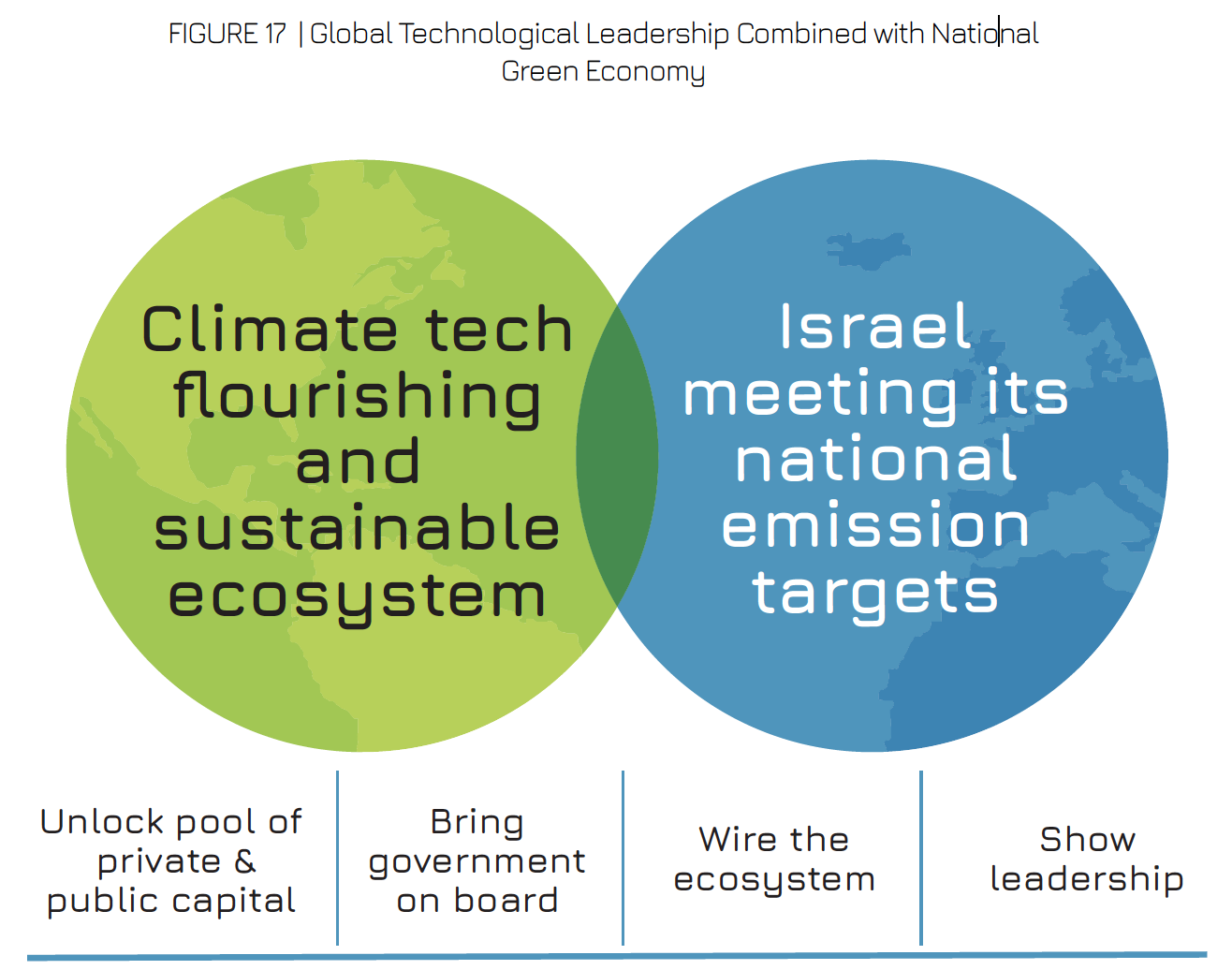Israel has the capability to contribute substantially to global emission reductions. Locally developed and adopted technologies are already responsible for emission reductions around the world that may be greater than the emissions the country itself generates. Increased adoption on a nationwide scale and increased global deployment would further increase Israel’s internal and global contribution to emission reduction commitments.
However, Israel has yet to exhaust its potential for innovation, commercialization and scaling up of climate tech solutions.
Fully realizing the potential of the Israeli climate technologies will both diversify the Israeli high-tech industry and create a global climate tech hub (with all its economic benefits), while a sustainable climate tech industry will promote global efforts for treating unmet climate needs, drive Israel towards meeting its national climate goals, boost employment and the economy, enhance local living conditions, reduce air pollution, and improve energy, water, and food security.
Climate tech deployment, especially with regards to infrastructure, is highly dependent on the government, both as a regulator and as a dominant customer. For its part, the government has a clear incentive to enable the development of local technological solutions and assist the country in achieving its national climate targets and must therefore take a significant and active role in driving the climate ecosystem forward.
This can primarily be achieved by:
Unlocking the Pool of Private and Public Capital
- Create a local sandbox – Turn national infrastructure into a technological beta site which, together with regulatory waivers, will enable startups to learn, consult, test, and showcase a successful first implemented product in Israel and increase their chances for gaining private investment or a market for their product.
- Make international partners and funding programs accessible – Expose Israeli technologies and startups to the large-scale international funding programs such as the EU Green Deal, and provide the support necessary to increase their chances of receiving a grant. In addition, leverage Israel’s international agreements (such as with the US federal government) to connect local entrepreneurs with large corporations’ knowledge, expertise, and calls for open innovation which will assist in scaling up their business.
- Align government funding criteria with those of the private funds – Implement environmental, social and governance (ESG) criteria and assess the potential climate impact of technologies via the Israel Innovation Authority’s evaluation process. Government grants usually serve as a startup’s first investment and assist in aligning their investor pitch with global standards, thus increasing their chances to gain private capital traction,including climate dedicated, global VCs.

Bringing Government on Board
- Apply regulations that facilitate the entrance of climate tech companies to the market – Israel should orient its regulations towards global benchmarks such as EU climate change mitigation instruments. Such new regulations could encourage companies to set short-term and longterm emission reduction targets and apply climate tech technologies.
- Government ministries’ collaboration to create joint climate tech initiatives to incentivize ideation of novel solutions – All government ministries need to assess how their missions affect climate and vice versa, identify the most significant challenges, and call on the ecosystem to provide climate change-related solutions that align with and advance their objectives. Financial incentives for deployment and scale up can be offered.
- The Israeli innovation ecosystem responds tremendously well to government calls to assist in times of crisis – The early stage of the COVID-19 crisis is a great example of this. Government ministries should join forces, define national climate-related challenges, and call on the ecosystem to respond and offer solutions.

Wiring the Ecosystem
- Enhance the “ecosystem effect” by creating a viable stream of knowledge, data and innovation between critical parts of the ecosystem – Connect the unmet need of local industry and government entities, together with novel solutions proposed by academia and entrepreneurs’ capabilities to develop these into a viable product.
- Engage world-leading Israeli high-tech companies in the climate crisis and national mitigation effort –Expose high-tech companies and entrepreneurs to unmet climate needs, provide the necessary training and knowledge to pivot existing technologies towards climate challenges, while creating new business models and opportunities.
- Enhance the multifaceted benefits of partnerships between large corporations or SMEs and startups –Successful corporate implementation of technologies can give a startup more credibility in the eyes of customers and investors. Such partnerships can help startups progress towards commercialization by providing financial assistance and institutional knowledge, and can open doors to new customers, distribution channels, and geographic locations.
Showing Leadership
- Create an overall vision for a carbon-neutral Israel as part of an ambitious, holistic, and integrated climate action plan – The growth potential of climate tech innovation could be fulfilled by embedding it within a broad vision for a carbon neutral Israel within a designated timeframe. Such a national plan would go beyond the recently revised and improved NDC20 and outline not only concrete emission pathways but also development of policy options, strategies, financial incentives and solutions. A growing number of countries have adopted legislation specifying a target of net zero emissions by 2050 or earlier. Doing the same would allow Israel to fulfil and go beyond the committed national contributions under the Paris Agreement.
- 20.Nationally Determined Contribution submitted to the UN Framework Convention on Climate Change, August 2021
